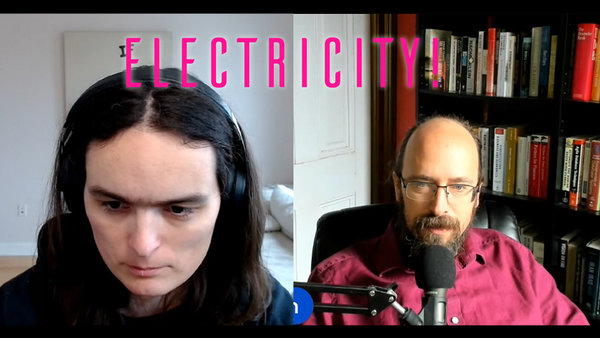Is Abundance Based?
The inherent contradiction of abundance conservatism.

As the Democratic Party and those left-of-center start their long foray through the political wilderness, they hope to find a new exciting ideology and message that they can take to the electorate, one that provides a compelling narrative about the era’s problems, solutions, and—most important of all—villains. Within that struggle, an idea has emerged: the Abundance Agenda. It’s so promising, in fact, that it's even got a Congressional Caucus now. Abundance is a simple concept: in the current era, public policy should focus more on the supply side; making sure that we can produce more of the things we value most, such as housing, healthcare, and energy among others.
As a testament to this agenda’s appeal, some conservatives argue they are the natural home for abundance. Conservatism is supposedly best suited for promoting abundance and prosperity through its focus on free markets and disinterest in the supposed things that hold back the American economy: regulations, “wokeness”, and an obsession with trying to solve problems by throwing money at them.
While this may have been true in your father’s conservatism, the unfortunate reality is that conservatism today is difficult to reconcile with the Abundance Agenda. Today’s conservatism is plagued by the same problems of yesterday’s progressivism. Conservatives today are unable to ruthlessly prioritize: their recent actions show that they care more about their numerous social policy goals than economic dynamism. Conservatives today also engage in their own form of wokeness, giving special attention to the groups and forms of life they perceive as disadvantaged or slighted, even at the expense of the common good. And at the international level, conservatives today practice the same zero-sum politics that led to progressives prioritizing distribution at the expense of growth and innovation.
This is not to say that people on the right cannot be allies in the Abundance Agenda. But abundance must be led by those who prioritize material concerns, common dignity for all people, and a “live and let live” approach to social values.
The sort of folk you might know as liberals.
Abundance as a concept
Abundance as a political agenda is about focusing less on redistributing things in society (especially important things like housing, healthcare, etc.) and more producing said things at lower cost, greater quality, and most importantly, in more unique and innovative ways. Much of the political debates in the past decade had focused on equalizing the ability to purchase and consume these goods, often through subsidies such as food stamps, housing vouchers, and health insurance subsidies.
The problem is that when the ability to supply these goods is restricted (or “inelastic”), whether through regulations or market failure, these subsidies are more likely to increase the price of these goods rather than their quantity. As such, the status quo has not been able to do much to put a dent in the rising cost of important goods such as housing, healthcare, or even the price of higher ed.
In his inaugural essay, Derek Thompson talked specifically about increasing the abundance of comfort, power, and time to answer the question: more of what? We should prioritize improving the supply-side of goods that directly help us in ways fundamental to human dignity. To have more time outside of work, we need better public transit. To live more comfortable and less painful lives, we need access to better medicine and health treatments. And for more control over our lives, we need these goods to be cheap enough that we don’t go broke trying to get them and access to education and training that raises our incomes.
It’s not a particularly useful philosophy to say that “everything matters.” Political ideologies are meant to help us ruthlessly prioritize. Some pursuits are more important than others and ideology helps us figure out what those are. In emphasizing that we need more of the goods listed above, the Abundance Agenda effectively puts them above many of the other goals that progressives have prioritized in recent years such as diversity, reparations for past harms, and even greater equality in society.
As an exercise, it’s always useful to ask why the status quo hasn’t achieved the policy goals one hopes to achieve. For proponents of the Abundance Agenda, this failure comes from three places: “vetocracy”, “everything-bagel liberalism”, and “poor state-capacity”.
Vetocracy is the idea that too many different actors can find ways to block policies that would benefit the nation at the expense of their special interest. Think of environmental permitting requirements that allow those who oppose new housing to block construction. Or unions that block automation in our ports because it might lead to job loss. At the root of vetocracy is the hijacking of policy processes to stop competition and the very creative destruction we need for a more dynamic economy.
Everything-bagel liberalism simply means that we are using our policy tools for too many things and failing to achieve any of them. This is particularly a problem in our procurement processes, where we mandate diversity, unionized labor, American suppliers, and even miscellaneous requirements like childcare provisions such as those in the CHIPs Act. These extraneous goals slow down and sometimes completely stop our ability to complete projects.
Finally, poor state capacity refers to the government’s inability to achieve its policy goals. Oftentimes, federal agencies fail to implement policies because they lack the resources to do so. We have huge issues with outdated tech infrastructure, an under-trained workforce, and general funding that make it harder for us to achieve our goals.
What a conservative wants
If so much of the Abundance Agenda is in response to progressive failures, why couldn’t conservatives carry the mantle? The Tech Right after all is regularly saying It’s Time to Build. And the Republicans have historically been the natural party for cutting through red tape, slashing ineffective programs, and not getting bogged down in debates about social justice.
Of course, as with anyone else, conservatives have rarely only wanted to build for building’s sake. Conservative political philosophy is centered around increasing the strength and “quality” of three core institutions: family, local communities, and work. The “quality” component here means in line with conservative social preferences. For the family, conservatives prefer two-parent heterosexual families of large size, sometimes built upon a male breadwinner. For local communities, conservatives prioritize low-density rural and exurban communities built on single-family homes and car-based transportation. And for work, conservatives believe that the nation’s workforce must be much more grounded in manufacturing and agriculture and that more people should go into the trades than college.
As it goes for progressives, the problem is that these values lead to conservatives engaging in “Yes, but…” thinking. Yes, building more homes and increasing housing density would be great, but…it would sure be nice if more people moved out of the cities and stayed in single-family homes. Yes, faster transportation would be great…but driving cars is preferable to public transit and congestion pricing punishes drivers. Yes, lower prices on manufactured goods would be great…but we need to bring that manufacturing home at higher wages that would certainly raise prices in a competitive economy.
You can think of Abundance as aspirational in an almost theological way. All of us strive to transcend the dirty, fallen world of actual politics, with interest group haggling and identity-based conflicts, into the purer world of politics that serves the common good and prioritizes concrete issues over symbolic ones. But too often, “sin”, here the desire to prioritize subjective, narrow preferences, drags us back down.
No two sinners are alike of course and conservatives are dragged down from Abundance through their own set of vices: everything-bagel conservatism, right-wing wokeness, and zero-sum internationalism.
Everything-bagel conservatism means that conservatives themselves suffer from a desire to use policy for achieving too many goals. They want to make government more efficient, while simultaneously gutting government through sloppy, often illegal, firings, and “creative” ways to withhold funds from under-resourced agencies. Some have even discussed incorporating family size into hiring preference and therefore de-emphasizing merit and deprioritizing the goal of effective governance.
At the same time, there’s the issue of right-wing wokeness: the desire to privilege their perceived victims over the perceived victimizers—and good economic policy. This includes incentivizing dying industries like coal, but also explicitly promoting some industries, such as manufacturing and agriculture, over others like services because said industries are seen as more authentically American and worthy of support.
Finally, there’s the issue of zero-sum internationalism. Abundance is predicated on the idea of win-wins; that there are things we can do that raise the tide for everybody. But the current conservative approach to foreign affairs is the opposite of that. It’s the idea that our country can only win by creating situations where other countries “lose”, something antithetical to the very idea of abundance as it effectively treats all matters of international affairs as fighting over scarce resources.
You may think: so what? Every political agenda has many masters: modern conservatism is no different. But a deeper look at some of the key policy areas today shows just how deeply embedded these contradictions are and how much of a barrier these fundamental sins are to a conservative abundance.
Housing
How committed are you to building more housing if you believe in preserving zoning laws? Project 2025 supports all kinds of deregulation, but explicitly “oppose(s) any efforts to weaken single-family housing”, a regulation that effectively bans denser forms of housing that would bring down rents and home prices alike. While some state governments have achieved real success in zoning reform, the administration continues to push the line that Democrats want to destroy the suburbs, a form of thinking not exactly conducive with the goal of building more.
Science and research
It’s hard to see conservatives as placing a priority on research and knowledge creation given how they’ve treated the universities. They have frozen the grant system in key agencies such as the National Institute of Health and the National Science Foundation while claiming it’s in reaction anti-semitism or DEI initiatives. But such freezes directly fall on the programs they are meant to fund, the very forms of cutting-edge research we need to increase abundance in critical industries. The Administration is also trying to coerce universities by threatening to revoke tax-exempt status. This would chill the ability of faculty to engage in active debate and discussion on issues that are a critical part of the research process.
Research isn’t like any other enterprise; it’s chaotic and free-flowing, not planned out in advance. When officials say things like they’ll make a major scientific discovery in a set time frame, they’re saying they’d rather find the answers they were hoping for than create genuine knowledge.
While much of the conversation around Abundance centers around removing regulations aka bad sticks, the other critical side of it is increasing our ability to provide good carrots, including subsidies for research that the market usually undersupplies. A true approach to abundance wouldn’t just be shrinking the size of government; it would include government support for processes conducive to innovation and growth.
Immigration
You can’t have more stuff coming out if you don’t have more stuff going in. Conservatives agree on that when it comes to extracting natural resources, but one can’t divorce the production process from human input. One of the nastiest inter-party fights this year in the Republican Party was over the H1B program, a program that while imperfect is one of the few available for bringing in the high-skilled talent needed for improving production. The most obvious way this policy collides with the desire for abundance is that fewer people in the short-run almost certainly means fewer things made. To be sure, some conservatives have recognized this issue and proposed increasing the birth rate in response. But barring a push for more child labor (which one cannot completely rule out), having more kids that become adults decades in the future won’t clear any bottlenecks today. A Nativist America is not an Abundant America and certainly not a prosperous one.
Trade
Of all the policy areas relevant to Abundance, trade is the most glaring in how far it deviates from the ideal. Our current approach to trade can at best be called “less is somehow more”. We have put tariffs across all other countries and sectors, including a general 10% tariff. These tariffs are not just restrictions on foreign producers, they are restrictions on Americans' ability to consume the goods they want, including goods that can’t be domestically sourced and capital goods and inputs that we need for domestic production. A tariff on everything runs into the same issue as the Administration’s approach to immigration: fewer inputs will simply mean fewer outputs.
Energy
Energy in theory should be the bright spot. After all, conservatives are pro-energy exploration and anti-NEPA. They want to increase fracking, drilling, and nuclear power and are prepared to remove the barriers to do so. But even here, the movement falls short in key ways. In Texas, the state legislature is using permitting rules and regulation to block the expansion of wind and solar energy, effectively blocking new profitable cheap sources of energy. It is hard to claim one supports a market-based or profit-driven approach to energy when the Administration is using wartime powers to try keeping the increasingly unprofitable coal industry afloat. The Department of Governmental Efficiency (“DOGE”) is also stripping funding from the Loan Programs Office, whose funds provide the scale needed for critical energy sources such as nuclear and geothermal power. Finally, it is unclear whether the tax credits for green energy will survive into the next year which have been important for scaling new-ish technologies such as electric vehicles, charging stations, and solar panels. This is politics at its most cultural and post-material; using the carrots and sticks of federal power to pick unprofitable losers over profitable winners.
Go forward
The challenge of an Abundance Agenda is not to unite factions per se but to transcend the underlying politics that leads us away from good policy. Conservatives and progressives alike have struggled with the same base desires to engage in in-group redistribution and moral purification that have led them away from focusing on the common good. The difference though is that the left-of-center is now willing to have the conversation of how that’s been a problem and how to overcome it. Alas, conservatives are burdened with the curse of victory: it’s hard to see what’s wrong when you’ve had a solid run of the public thinking that you’re right. Until that time passes, it will be difficult to see the kind of reckoning needed to truly articulate and push for a conservative vision of abundance.
Featured image is Sparks, Nevada, by Ken Lund




